Qubrit (Virtual Business Card Holder): Startup Development Report
Preamble
I absolutely welcome everyone. Exactly 3 months ago we launched the Qubrit project about which we already wrote on Habré. Who cares to read here
- Qubrit.com: How we did Startup 2
and here
- Qubrit project (business card) - need Habrapamers advice
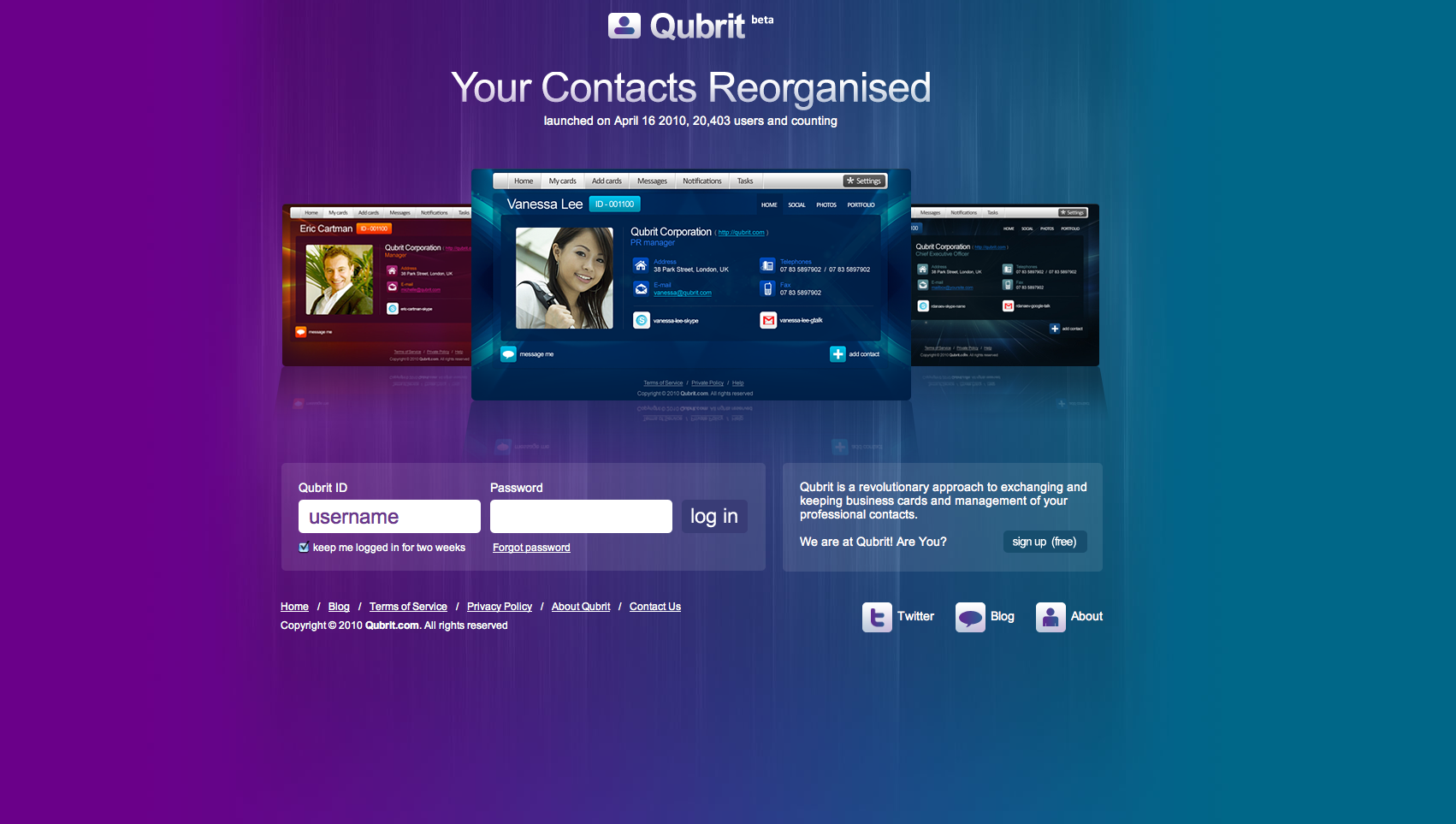
During these 3 months, we have grown well, added new functions, abandoned some others, and generally changed the concept of the project in some way.
(caution - traffic)
Interesting statistics for today (Qubrit launch date April 16, 2010)
Server: Dedicated Dual Quad Core Xeon, 4GB RAM, Cisco firewall, 1TB brandwidth, Windows 2008 with Rackspace.co.uk
- programmer (asp.net): 1
- designer: 1
- administrator of the north: 0.5 (freelance lad)
- boss: 1 (that's me) + another co-founder
- users: 20,318 (of them 30-40 profiles were created by us during testing)
- percentage of users logging in at least once a week: 22% (for the last week)
- the number of users invited by other users: 1,260
- The average number of business cards (friends) for each user: 2.1 (for example, on Facebook, on average, each 130 friends. Well, there is something to work on)
- demography: USA - 29%, Russia - 22%, (thanks to Habra for traffic) England - 17%,
- gender: Husband - 74%, Female - 22%, Aliens - 4% :)
- the number of uploaded photos: 280 (only);
So the new Qubrit. I want to focus on the most important points.
')
- Homepage
Due to the fact that our past design was, to put it mildly, not super and the opinion of the habrau users confirmed it, we redid the design of the main one. Now it is a login and password field, and 3 photo cards for the new user to immediately have the first positive impression about the web service and an understanding of what is waiting for them inside. In general, it turned out bright and everyone likes. And don't tell me that MobileMe (me.com) has a design similar to ours.
- Actually Business Card
Redesigned business card itself, the location of elements and design. It was decided that it is still interesting when there is a user photo or logo on the business card if it is a company business card. Added a place for Skype and Dzhimeyla. By default, the standard theme of the business card is monochrome, which is designed for the mass user.
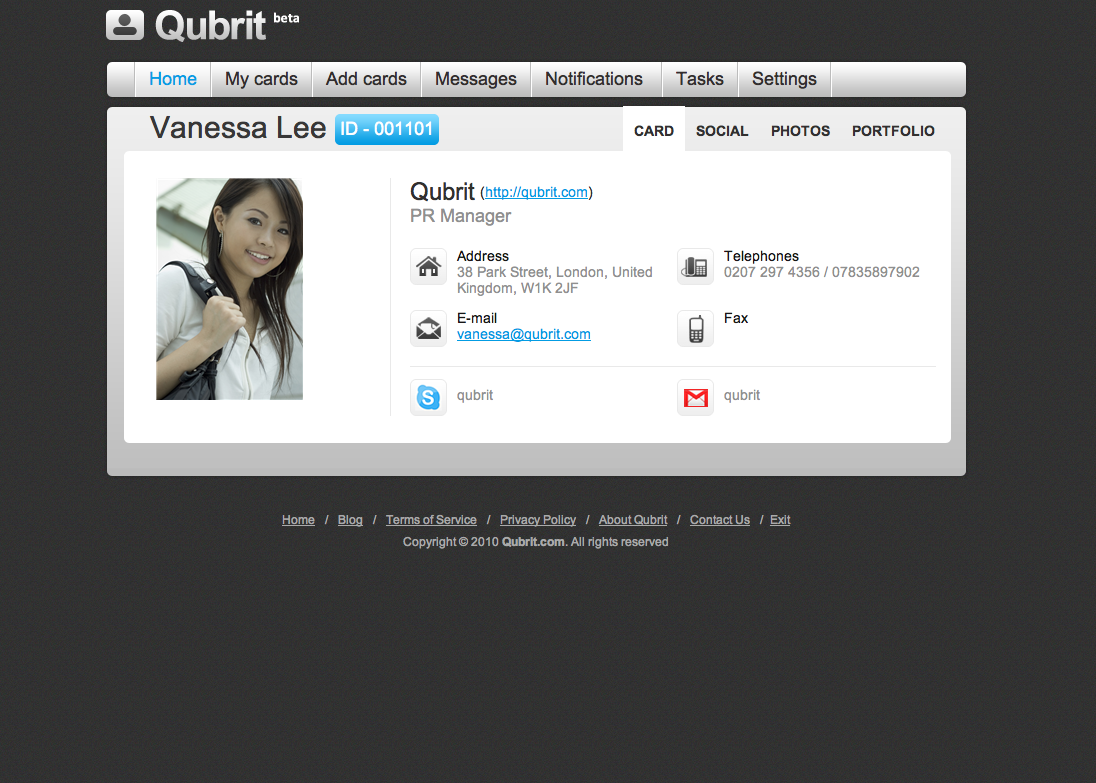
After much deliberation, we decided that there was no “friend and comrade’s taste and color” and 3 Temka business cards were forgotten so that the users would be happy. This feature of selecting a Theme for a business card will be available somewhere in the very beginning of August.

A little later, we will present a couple more options for the design of business cards with differently located elements, as well as one where the location of the elements can be selected by yourself.
- Messages
Messaging is a system of internal communications between users. Everything is quite simple and understandable. We write each other letters about everything. At some point we decided to make mail for users in the format xxxxxx@qubrit.com, where xxx is your Qubrit ID, but we decided that we’ll deal with Gmail a little later.
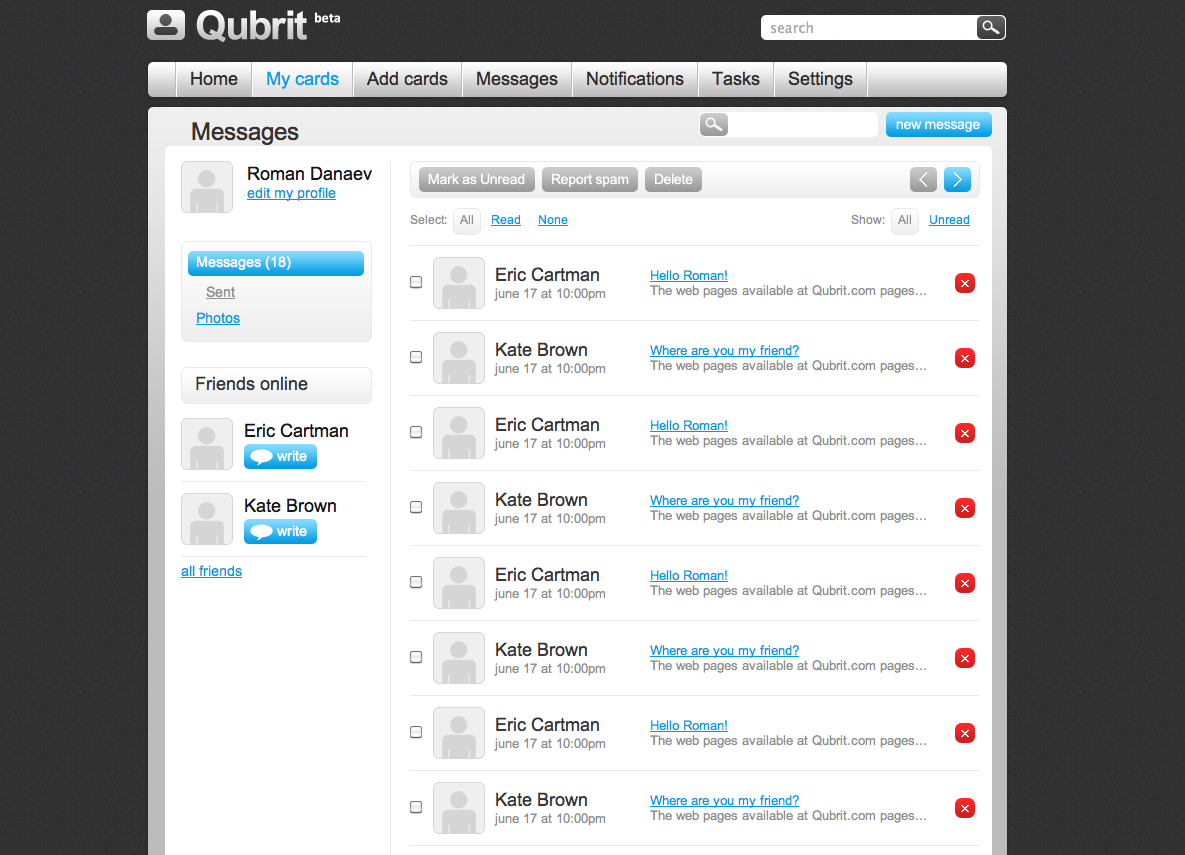
The feature of the “message” is not ready yet - we plan to finish it by mid-August.
- Labels (Smart Labels)
So, firstly it is important that the user has a list of all business cards in one place in a conveniently readable format. At the moment, the Mycards page (Business Card) is a list of all contacts (business cards of other people) with basic information about their business cards.
Secondly, we invented business cards labels. Labels are ordinary tags that can be assigned to each business card in the amount of up to 5 pieces and choose colors for the given label. That is, to Fedor Sumkin's business card - I can assign labels - “programmer”, “layout designer”, “php” and accordingly I can search among my business cards according to these labels.
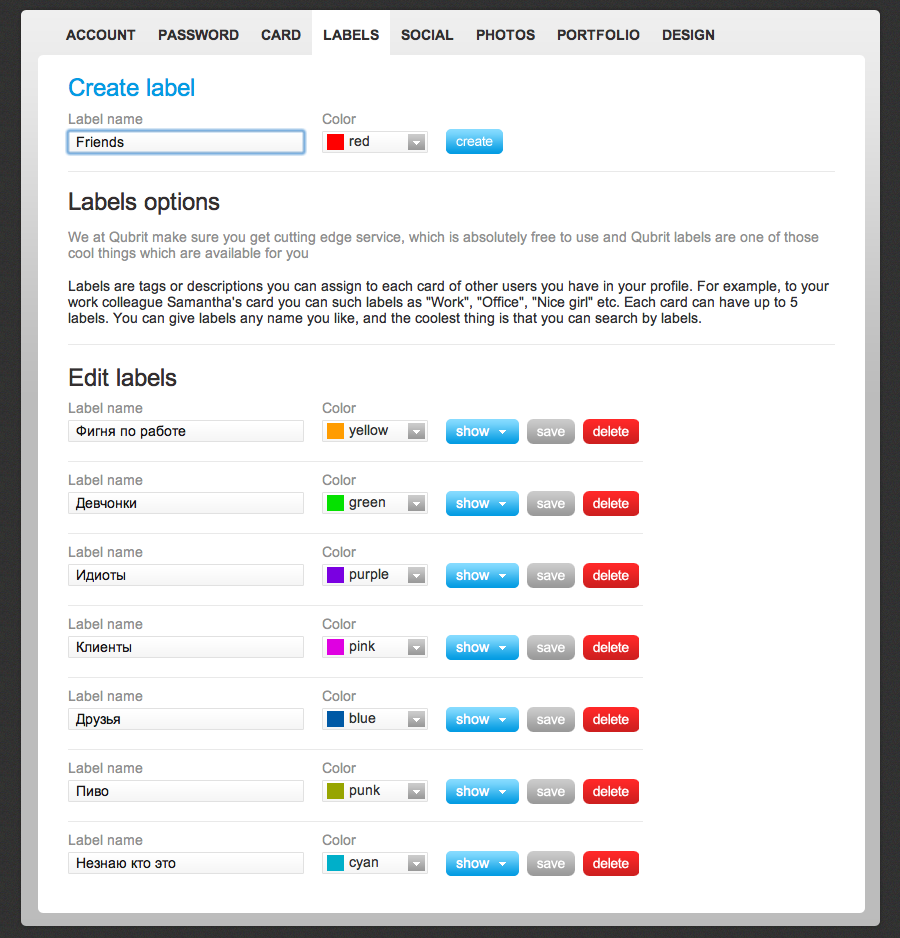
According to a recent study by Paul Adams from Google The Real Social Network 2 - the main problem of all modern social networks is that all user contacts are grouped under the heading of "friends" that all your information is available while in the real world (offline) all your friends are shared to many other categories such as "friends from the old city", "friends from work", "friends in this city", "just colleagues", "classmates", "the familiar bartender". Only with a very small percentage of these people do you constantly communicate with others very rarely and with some never at all. But the problem is that all of them are in your friends on Facebook, Linkedin, Odnoklassniki, etc., and see all your information and statuses, which creates some inconveniences in that you can’t write " Boss asshole, steam me already " in Facebook status boss in your friends.
Why am I doing this? To the fact that in Qubrit Labels we implement Smartlabel technology, which allows you to display certain data about your failure for certain categories of labels. For example: you create a label “Colleagues” and define in the settings that “Colleagues” can see the info defined about you. The list of choices and the moment is this - phone, email, skype, gemail, list of social networks, photos, portfolio, list of your business cards. That is, under any label, you can choose any list of what will be visible to business card holders to whom you specify certain labels.
Smartlabel is currently in the early stages of testing, but we welcome your comments.
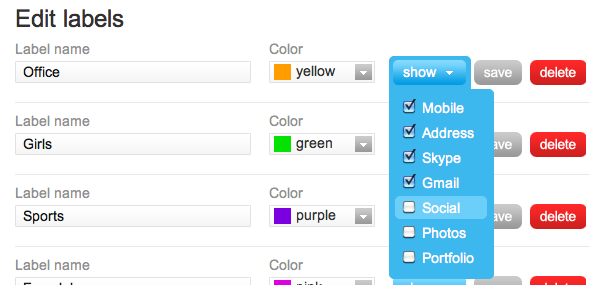
- portfolio
Now for each business card you can make your own virtual portfolio, which we without hesitation made in the form of a resume (CV). All data in the portfolio is exactly the same as in other pages are edited via Settings. We want to integrate the portfolio with an additional business communications service and learn a couple of interesting features from LinkedIn.
Investment and VC.
In general, understanding where this project is going, I began to treat investors. At the very beginning of the project, I had a proposal from one British venture capital company, but they gave little, demanded a large share + a bunch of other conditions, which in principle meant for me, though small, but a victory. But thinking that once these are interested, then others will be interested.
Started making pitches (offers) mainly for US venture funds and private investors. Someone gently refused at once, and someone after a heap of questions, the main of which was “What are you cooler than Facebook or LinkedIn”. (great site for this http://angel.co )
The most memorable among all was Kevin Rose (the founder of digg), who in two words gave me perhaps the best advice. The essence of his answer was: “Do not contact anyone, develop the project, advertise it where you can, grow the user base and create a buzz about it and investors will come to you themselves, then you will be able to download the conditions.”
My 50 cents : Qubrit today is a little-known and generally not very demanded project that exists on pure intuition and own financing. Somewhere I recently read about the Top 5 reasons why start-up start-ups are abandoned:
- you will not have users;
- you run out of money;
- you will be upset by slow growth;
- you will be attracted by something else (or decide what is better to do another satrap);
- you startup will not overcome competitors;
In general, for 3 months with Qubrit there were also reasons for disorder and joy when the 1000th user registered and misunderstanding in terms of “ok, what to do next” and much more.
But perseverance and hard work are all going on, 20,000 users in 3 months is not a bad indicator, I plan to reach 100,000 users by the new year, and then I’ll think like clockwork, because there is an opinion that after the 100,000th barrier of users the startup will surely fly rocket.
One last thing: I'm still trying to get on Mashable, Techcrunch, RRW or another similar site / blog. I sent letters to them - but they persistently ignore Qubrit, although they write about how some girl got married through Facebook and everyone is happy about it. I think such news today is more in demand by the average English-speaking user. So do not be surprised if you soon read somewhere that "After 5 years, the husband found a wife who had amnesia through the Qubirt."
As one of my teachers used to say when I was still studying here at the London School of Economics - the harder you work - the luckier you get.
However, thank you for your attention!
Link: http://qubrit.com
PS In my little illustrations - so here, Sunshine Girl
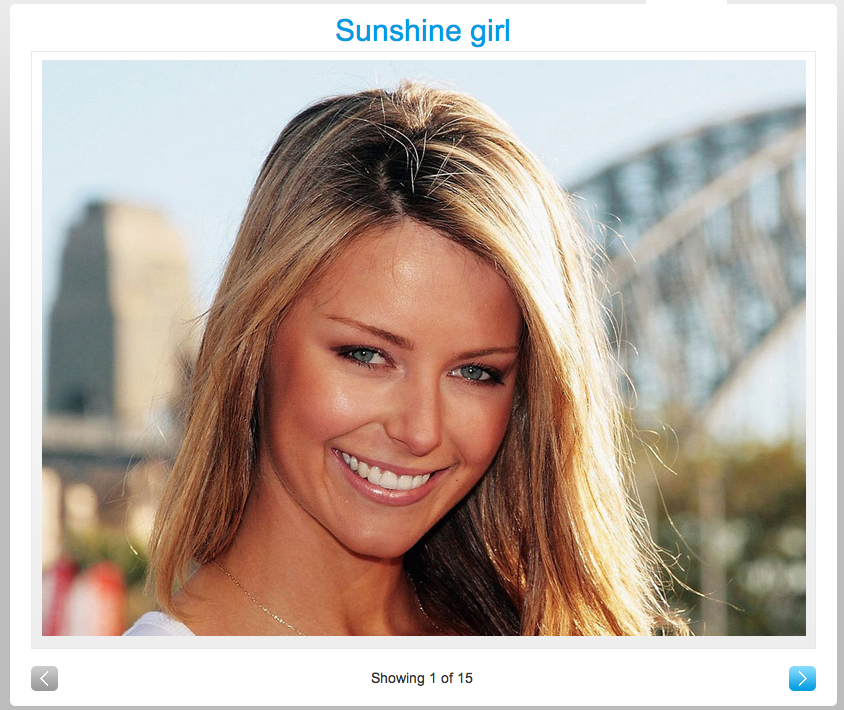
I absolutely welcome everyone. Exactly 3 months ago we launched the Qubrit project about which we already wrote on Habré. Who cares to read here
- Qubrit.com: How we did Startup 2
and here
- Qubrit project (business card) - need Habrapamers advice

During these 3 months, we have grown well, added new functions, abandoned some others, and generally changed the concept of the project in some way.
(caution - traffic)
Interesting statistics for today (Qubrit launch date April 16, 2010)
Server: Dedicated Dual Quad Core Xeon, 4GB RAM, Cisco firewall, 1TB brandwidth, Windows 2008 with Rackspace.co.uk
- programmer (asp.net): 1
- designer: 1
- administrator of the north: 0.5 (freelance lad)
- boss: 1 (that's me) + another co-founder
- users: 20,318 (of them 30-40 profiles were created by us during testing)
- percentage of users logging in at least once a week: 22% (for the last week)
- the number of users invited by other users: 1,260
- The average number of business cards (friends) for each user: 2.1 (for example, on Facebook, on average, each 130 friends. Well, there is something to work on)
- demography: USA - 29%, Russia - 22%, (thanks to Habra for traffic) England - 17%,
- gender: Husband - 74%, Female - 22%, Aliens - 4% :)
- the number of uploaded photos: 280 (only);
So the new Qubrit. I want to focus on the most important points.
')
- Homepage
Due to the fact that our past design was, to put it mildly, not super and the opinion of the habrau users confirmed it, we redid the design of the main one. Now it is a login and password field, and 3 photo cards for the new user to immediately have the first positive impression about the web service and an understanding of what is waiting for them inside. In general, it turned out bright and everyone likes. And don't tell me that MobileMe (me.com) has a design similar to ours.
- Actually Business Card
Redesigned business card itself, the location of elements and design. It was decided that it is still interesting when there is a user photo or logo on the business card if it is a company business card. Added a place for Skype and Dzhimeyla. By default, the standard theme of the business card is monochrome, which is designed for the mass user.

After much deliberation, we decided that there was no “friend and comrade’s taste and color” and 3 Temka business cards were forgotten so that the users would be happy. This feature of selecting a Theme for a business card will be available somewhere in the very beginning of August.

A little later, we will present a couple more options for the design of business cards with differently located elements, as well as one where the location of the elements can be selected by yourself.
- Messages
Messaging is a system of internal communications between users. Everything is quite simple and understandable. We write each other letters about everything. At some point we decided to make mail for users in the format xxxxxx@qubrit.com, where xxx is your Qubrit ID, but we decided that we’ll deal with Gmail a little later.

The feature of the “message” is not ready yet - we plan to finish it by mid-August.
- Labels (Smart Labels)
So, firstly it is important that the user has a list of all business cards in one place in a conveniently readable format. At the moment, the Mycards page (Business Card) is a list of all contacts (business cards of other people) with basic information about their business cards.
Secondly, we invented business cards labels. Labels are ordinary tags that can be assigned to each business card in the amount of up to 5 pieces and choose colors for the given label. That is, to Fedor Sumkin's business card - I can assign labels - “programmer”, “layout designer”, “php” and accordingly I can search among my business cards according to these labels.

According to a recent study by Paul Adams from Google The Real Social Network 2 - the main problem of all modern social networks is that all user contacts are grouped under the heading of "friends" that all your information is available while in the real world (offline) all your friends are shared to many other categories such as "friends from the old city", "friends from work", "friends in this city", "just colleagues", "classmates", "the familiar bartender". Only with a very small percentage of these people do you constantly communicate with others very rarely and with some never at all. But the problem is that all of them are in your friends on Facebook, Linkedin, Odnoklassniki, etc., and see all your information and statuses, which creates some inconveniences in that you can’t write " Boss asshole, steam me already " in Facebook status boss in your friends.
Why am I doing this? To the fact that in Qubrit Labels we implement Smartlabel technology, which allows you to display certain data about your failure for certain categories of labels. For example: you create a label “Colleagues” and define in the settings that “Colleagues” can see the info defined about you. The list of choices and the moment is this - phone, email, skype, gemail, list of social networks, photos, portfolio, list of your business cards. That is, under any label, you can choose any list of what will be visible to business card holders to whom you specify certain labels.
Smartlabel is currently in the early stages of testing, but we welcome your comments.

- portfolio
Now for each business card you can make your own virtual portfolio, which we without hesitation made in the form of a resume (CV). All data in the portfolio is exactly the same as in other pages are edited via Settings. We want to integrate the portfolio with an additional business communications service and learn a couple of interesting features from LinkedIn.
Investment and VC.
In general, understanding where this project is going, I began to treat investors. At the very beginning of the project, I had a proposal from one British venture capital company, but they gave little, demanded a large share + a bunch of other conditions, which in principle meant for me, though small, but a victory. But thinking that once these are interested, then others will be interested.
Started making pitches (offers) mainly for US venture funds and private investors. Someone gently refused at once, and someone after a heap of questions, the main of which was “What are you cooler than Facebook or LinkedIn”. (great site for this http://angel.co )
The most memorable among all was Kevin Rose (the founder of digg), who in two words gave me perhaps the best advice. The essence of his answer was: “Do not contact anyone, develop the project, advertise it where you can, grow the user base and create a buzz about it and investors will come to you themselves, then you will be able to download the conditions.”
My 50 cents : Qubrit today is a little-known and generally not very demanded project that exists on pure intuition and own financing. Somewhere I recently read about the Top 5 reasons why start-up start-ups are abandoned:
- you will not have users;
- you run out of money;
- you will be upset by slow growth;
- you will be attracted by something else (or decide what is better to do another satrap);
- you startup will not overcome competitors;
In general, for 3 months with Qubrit there were also reasons for disorder and joy when the 1000th user registered and misunderstanding in terms of “ok, what to do next” and much more.
But perseverance and hard work are all going on, 20,000 users in 3 months is not a bad indicator, I plan to reach 100,000 users by the new year, and then I’ll think like clockwork, because there is an opinion that after the 100,000th barrier of users the startup will surely fly rocket.
One last thing: I'm still trying to get on Mashable, Techcrunch, RRW or another similar site / blog. I sent letters to them - but they persistently ignore Qubrit, although they write about how some girl got married through Facebook and everyone is happy about it. I think such news today is more in demand by the average English-speaking user. So do not be surprised if you soon read somewhere that "After 5 years, the husband found a wife who had amnesia through the Qubirt."
As one of my teachers used to say when I was still studying here at the London School of Economics - the harder you work - the luckier you get.
However, thank you for your attention!
Link: http://qubrit.com
PS In my little illustrations - so here, Sunshine Girl

Source: https://habr.com/ru/post/100388/
All Articles